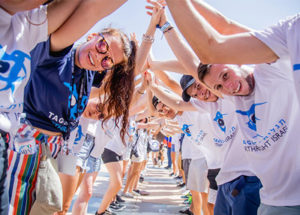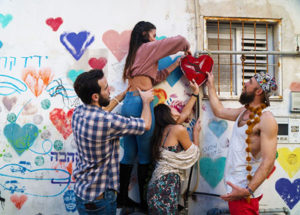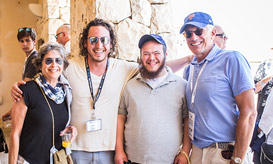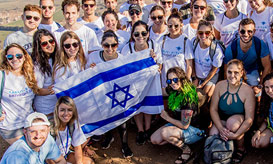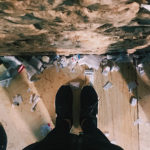750,000 young Jewish adults from 68 countries have experienced the 10 Values of Birthright Israel and…
Natalie Leinbach is a 2019 Birthright Israel Alumna currently studying Communications and Economics at the University of Maryland, College Park. Below is a personal video she made to remember her Birthright Israel trip and showcase her favorite moments. You can scroll down to read our interview with Natalie as well!
What type of Birthright Israel trip did you choose to go on?
I chose to go with Maryland Hillel, The Center for Jewish Life at the University of Maryland. I liked this trip because I knew it would help me form connections with Jewish students here at my home campus.
What was the major factor that drove you to sign up for Birthright Israel?
The biggest factor in my decision was my sister. She really wanted to go on this trip to learn more about our Jewish identity and insisted that this exploration would be most beneficial if we did it together. She was a senior at UMD when we went on the trip, so it was our last chance to take the journey together.
Can you describe your Jewish background or upbringing?
My mother was raised Jewish. Both of her parents were raised in Orthodox households, so my grandparents brought up my mom and her siblings rather conservatively. My mom did not maintain this tradition for my sister and me. We celebrated high holidays and only went to temple during those times of the year.
What did you learn while on Birthright Israel?
The most important thing that I learned on the trip is that being Jewish means different things to different people. On our trip, there was a lot of emphasis on Judaism as a spectrum ranging from deep religious commitment to a loose cultural/ethnic identification, and everything in between.
My sister and I never had the privilege of going to Hebrew school or fully immersing ourselves in Judaism when we were young, but that does not mean that we are any “less Jewish” than our peers. We thought we might be a bit ashamed of our lack of knowledge and involvement in our Judaism, but what we found was an accepting and inviting community. We learned that we can still hold Judaism close to our identity without being conservative in our religious practice.
What was your favorite part of the trip?
That is a really hard question. Everything was exceptional! I think my favorite part of the trip was the day we spent in Jerusalem. There was a moment when we were on the rooftops of the city, and we could hear church bells ringing, Jewish prayer from the Western Wall, and Muslim calls to prayer all at once. The meld of cultures all in one Holy City was unforgettable.
Did you get to ask questions about what you were experiencing while on the trip?
Yes, my trip had many opportunities for discussion and questions. It was all very thought-provoking and is part of the reason why this trip to Israel was so special. Each night our trip leaders guided discussions that helped us explore what Judaism means to us and how it fits into our lives. Through these exercises, we were challenged to confront these questions while comparing our thoughts to those of our peers. We also had lots of dialogues about different forms of Judaism when we visited different places. In Tzfat, for example, we explored Jewish mysticism.
Has Birthright Israel changed your view of Judaism and/or Israel?
Judaism connects people in a global network that I did not fully understand until traveling to Israel. Israel is truly a holy space, with an energy that you can’t understand until you come here and feel it for yourself. Birthright has revealed how safe and comforting the state of Israel feels. Furthermore, the trip has allowed me to realize how Judaism can function in many different ways, not just religiously.
What did you learn from interacting with the Mifgash? What do you think they learned from interacting with you?
I learned a lot about the day to day life of young people growing up in Israel, especially during their time in the military. I also learned about their perceptions of Americans, most of which come from pop culture outlets like Netflix shows. It’s hard to say what they learned from interacting with us. Maybe more about the day to day life of university students and a bit about how we interact with one another. But both groups certainly learned that we are really not so different from one another.

